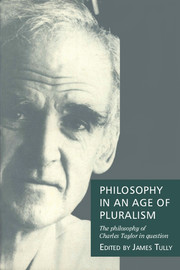Book contents
- Frontmatter
- Contents
- Notes on the contributors
- Preface
- Acknowledgements
- Introduction
- Part I Foundations
- Part II Interpreting modernity
- Part III Natural and human sciences
- Part IV Philosophy in practice
- Part V Ethics, politics and pluralism
- 10 Rights and pluralism
- 11 The political theory of strong evaluation
- 12 Philosophy and political judgement in a multinational federation
- Part VI Reply and re-articulation
- Bibliography of the works of Charles Taylor
- Index
12 - Philosophy and political judgement in a multinational federation
Published online by Cambridge University Press: 05 June 2012
- Frontmatter
- Contents
- Notes on the contributors
- Preface
- Acknowledgements
- Introduction
- Part I Foundations
- Part II Interpreting modernity
- Part III Natural and human sciences
- Part IV Philosophy in practice
- Part V Ethics, politics and pluralism
- 10 Rights and pluralism
- 11 The political theory of strong evaluation
- 12 Philosophy and political judgement in a multinational federation
- Part VI Reply and re-articulation
- Bibliography of the works of Charles Taylor
- Index
Summary
Charles Taylor has spent a good part of his adult life in a struggle to avoid the breakup of the Canadian federation. Much of his philosophical work can also be regarded as an attempt to understand and to interpret the sources of our malaise for others, in Canada and elsewhere. As a human being and as a philosopher, Taylor has himself benefited greatly from this effort. To borrow from his own appropriation of Hegelian concepts, his involvement – to be more specific, the numerous defeats that he has suffered – has worked like a series of enabling transitions leading to higher, more lucid stages of self-consciousness. From a state of better knowledge in Canadian affairs, Taylor has been able to move to a more refined understanding of our modern Western civilization. And vice versa.
Over the past thirty years, Charles Taylor has written at length on Canadian and Québec politics. This segment of his work, in itself, deserves an interpretive essay that would provide readers with the appropriate historical background. As an introduction to this project, I shall sketch out here a critical analysis of the position adopted by Taylor in the latest chapter of our seemingly endless constitutional saga, from the demise of the Meech Lake Accord in 1990 to the referendum held on 26 October 1992, when Canadians were asked whether or not they were in favour of the unanimous agreement concerning constitutional reform reached by political leaders two months earlier in Charlottetown, the cradle of the Canadian federation.
- Type
- Chapter
- Information
- Philosophy in an Age of PluralismThe Philosophy of Charles Taylor in Question, pp. 194 - 210Publisher: Cambridge University PressPrint publication year: 1994



